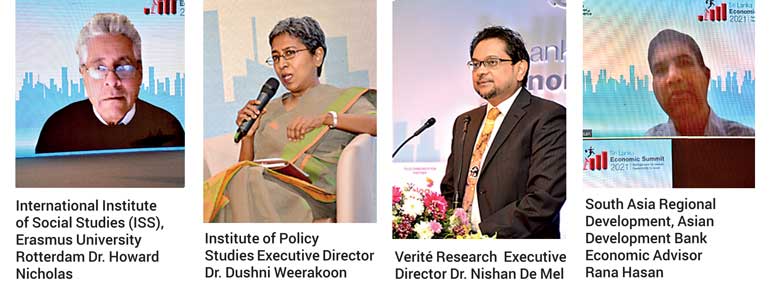Wednesday Feb 18, 2026
Wednesday Feb 18, 2026
Tuesday, 7 December 2021 01:51 - - {{hitsCtrl.values.hits}}

Ceylon Chamber of Commerce Economic Summit’s second session yesterday on how Sri Lanka will meet its debt obligations in the 2022-2026 period, calibrate its growth drivers, drive tax revenue, improve our credit ratings and manage key risks such as inflation and increase in income inequality.
International Institute of Social Studies (ISS) Erasmus University Rotterdam Dr. Howard Nicholas said recurring monetary instability is due to lack of industrialisation and not because of money printing or budget deficits.
“Printing money is no longer fashionable,” he said, adding that the key reason was the lack of industrialisation.
He emphasised that all developing countries that have thrived without industrialisation has gone into Balance of Payment (BoP) crisis.
Dr. Nicholas cited the rapid industrialisation took place in the late 1980s under the leadership of late President Ranasinghe Premadasa.
“Vietnam went aggressively for industrialisation in 2010 and they never had a BOP problem thereafter,” he pointed out.
“Countless studies have revealed that foreign debt serving issues, and low economic growth are due to lack of industrialisation,” Dr. Nicholas said, noting that the hot favourite now is lack of tourism earnings.
He said Colombo Port City would be a great opportunity for Sri Lanka, which offers different incentives to lure investors. Institute of Policy Studies (IPS) Executive Director Dr. Dushni Weerakoon said there are no easy fixes if Sri Lanka runs out of reserves as some have predicted.
“The symptoms of Sri Lanka’s fiscal side are what we see on our external current account. We have been borrowing to bridge the shortfall by spending more than we earn,” she said.
As per Dr. Weerakoon, Sri Lanka first needs a competitive export sector on ground and a real exchange rate. “We can’t do that overnight as we have an history of an overvalued exchange rate simply because our macros hasn’t been on a stable position,” she added. Explaining why Inability to tap the tariff regime was pointed out as a key reason why Sri Lanka missed to capitalise in terms of its industrial policy.
“The main reason is that it contributes to the Government revenues. We are not willing to bring down our Customs tariffs again for the obvious reasons of the fiscal policy,” the veteran economist said.
Noting that debt restructuring is the last option because it is very complex and costly affair for an economy like Sri Lanka, Dr. Weerakoon said: “How do we get out? I think our options are running out.”
Verité Research Executive Director Dr. Nishan De Mel said Sri Lanka’s key economic challenge remains managing the external debt repayments in the next five years, while focusing on growth.
Although the country is in an economic crossroads, he said a debt restructuring exercises could be explored.
He also explained on four steps approach from an in-house analysis that can make debt repayment more sustainable.
“Firstly, the interest rates on local debt can be no higher than inflation interest rates and secondly on foreign denominated loans can’t be higher than GDP growth. Then there are two other conditions that Sri Lanka needs to do more about. One is the primary deficit – that is the deficit after paying interest – which should be less than 60% of GDP growth – that means if the GDP growth is 5%, primary deficit can’t be more than 3%.
“The fourth is that depreciation of the currency can be no higher than inflation, and that brings us to the fifth step because currency depreciation today is not based on the fundamental mismatch in global crisis vs Sri Lankan crisis,” he explained.
Asian Development Bank (ADB) Regional Economic Advisor – South Asia Regional Development Rana Hasan fully agreed with Dr. Nicholas argument on industrialisation of the East Asian economies.
It was pointed out that South Asian countries need to upgrade its global competitiveness, move up the global value chains to unleash its true potential in industrial development.
He said Sri Lanka in particular has done well in the areas of skill migration whilst calling for more flexible labour laws to strengthen the sector.
“Urbanisation and land management are some of the lesson for Sri Lanka can learn from the successful East Asian economies. The investors need to be provided with vibrant and flexible amenities,” Hassan asserted.